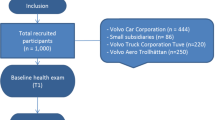Abstract
In this study, 32 first myocardial infarction (MI) cases and 42 healthy controls were compared with respect to vital exhaustion (VE), a state characterized by loss of energy, increased irritability, and feelings of demoralization. This state has been found to precede the onset of cardiac events. Participants also responded to questionnaires on Type A behavior, anger expression (Anger In, Anger Out, and Anger Control), and positive and negative self-concept. Results showed that VE discriminated well between MI patients and controls (Odds Ratio [OR] = 15.42, 95% confidence interval = 3.92-60.67) even when controlling for age, smoking, and exercise. The odds ratio decreased to 12.34 when controlling for socioeconomic status. Groups also differed in Anger In but not in Anger Control, Anger Out, negative or positive self-concept. Anger In was correlated to VE in all participants pointing to the relevance of withholding emotions in relation to exhaustion. Exhaustion was strongly associated with negative self-concept in the MI cases group only but significantly discriminated between cases and controls when adjusted for negative self-concept. Summarizing, the results show that, as has previously been found in other countries, in Venezuela VE is a precursor of MI.
Similar content being viewed by others
References
American Psychiatric Association. (1980). Diagnostic and statistical manual of mental disorders (3rd ed.). Washington, DC: Author.
Appels, A. (1990). Mental precursors of myocardial infarction. British Journal of Psychiatry, 156, 465–471.
Appels, A. (1997). Depression and coronary heart disease: Observations and questions. Journal of Psychosomatic Research. 43, 443–452.
Appels, A., Falger, P. R. J., & Shouten, E. G. W. (1993). Vital exhaustion as a risk indicator for myocardial infarction in women. Journal of Psychosomatic Research, 37, 881–890.
Appels, A., & Mulder. P. (1988). Excess fatigue as a precursor of myocardial infarction. European Heart Journal, 9, 758–764.
Appels, A., Golombeck, B., van Breukelen, G., de Vreede, & Gorgels, A. (In press). Sudden cardiac death in and out of hospital population and the risk of vital exhaustion. Journal of Psychosomatic Research.
Bages, N., Falger, P. R. J., Perez, M. G., & Appels, A. (1998). Measures of vital exhaustion and their associations with coronary disease risk factors in a Spanish speaking population. Manuscript submitted for publication.
Barefoot, J. C., & Schroll, M. (1996). Symptoms of depression, acute myocardial infarction, and total mortality in a community sample. Circulation, 93, 1976–1980.
Booth-Kewiey, S., & Friedman, H. S. (1987). Psychological predictors of heart disease: A quantitative review. Psychological Bulletin, 101, 343–362.
Buss. A., & Durkee, A. H. (1957). An inventory for assessing different kinds of hostility. Journal of Consulting Psychology, 21, 343–349.
Cook, W. E., & Medley, M. D. (1954). Proposed hostility and pharasaic-virtue scales for the MMPI. Journal of Applied Psychology. 38, 14–18.
Crisp, A. H., Queen, M., & DeSouza, M. (1984). Myocardial infarction and emotional climate. Lancet, 17, 616–619.
Dunn, S. E., Putallaz, M., Sheppard, B. H., & Lindstrom, R. (1987). Social support and adjustment in gifted adolescents. Journal of Educational Psychology, 79, 467–473.
Falger, P. R. J. (1989). Life-span development and myocardial infarction: An epidemiological study. Unpublished doctoral dissertation, University of Maastricht, The Netherlands.
Falger, P. R. J., & Schouten, E. G. W. (1992). Exhaustion, psychological stressors in the work environment, and acute myocardial infarction in men. Journal of Psychosomatic Research, 36, 777–786.
Falger, P. R. J., Schouten, E., Appels, A., & De Vos, Y. (1988). Sleep complaints, behavioral characteristics, and vital exhaustion in myocardial infarction cases. Psychology & Health, 2, 231–258.
Fielding, R. (1991). Depression and acute myocardial infarction: A review and reinterpretation. Social Science and Medicine, 32, 1017–1027.
Ingram, R. E., & Wisnicki, K. S. (1988). Assessment of positive automatic thinking. Journal of consulting and Clinical Psychology, 56, 898–902.
Kop, W. J., Appels, A., Mendes de Leon, C. F., de Swart, H. B., & Bar, F. W. (1994). Vital exhaustion predicts new cardiac events after successful coronary angiography. Psychosomatic Medicine, 50, 281–287.
Kop, W. J., Appels, A., Mendes de Leon, C. F., & Bar. F. W. (1996). The relationship between the severity of coronary artery disease and Vital Exhaustion. Journal of Psychosomatic Research, 40, 397–405.
Kop, W. J., Appels, A., Mendes de Leon, C. F., de Swart, J. B., & Bar, F. W. (1994). Vital exhaustion predicts new cardiac events after successful coronary angioplasty. Psychosomatic Medicine. 56, 281–287.
Meesters, C. & Appels, A. (1996a). An interview to measure Vital Exhaustion. I. Development and comparison with the Maastricht Questionnaire. Psychology and Health, 11, 573–581.
Meesters, C., & Appels, A. (1996b). An interview to measure Vital Exhaustion. 11. Reliability and validity of the interview and correlations of Vital Exhaustion with personality characteristics. Psychology and Health, 11. 557–571.
Siegman, A. W., Anderson, R., Herbst, J., Boyle, S., & Wilkinson, J. (1991). Dimensions of angerlhostility and cardiovascular reactivity in provoked and angered men. Journal of Behavioral Medicine, 15, 257–272.
Spielberger, C. D., Jacobs, G. E., Russell, S., & Crane, R. S. (1983). Assessment of anger: The State-Trait Anger Scale. In J. N. Butcher & C. D. Spielberger (Eds.), Advances in personality assessment (Vol. 2, pp. 159–185). Hillsdale, NJ: Lawrence Erlbaum Associates, Inc.
Van Diest, R., & Appels, A. (1991). Vital exhaustion and depression: A conceptual study. Journal of Psychosomatic Research, 35, 355–364.
Author information
Authors and Affiliations
Corresponding author
Rights and permissions
About this article
Cite this article
Bagés, N., Appels, A. & Falger, P.R.J. Vital exhaustion as a risk factor of myocardial infarction: A case-control study in Venezuela. Int. J. Behav. Med. 6, 279–290 (1999). https://doi.org/10.1207/s15327558ijbm0603_6
Issue Date:
DOI: https://doi.org/10.1207/s15327558ijbm0603_6




